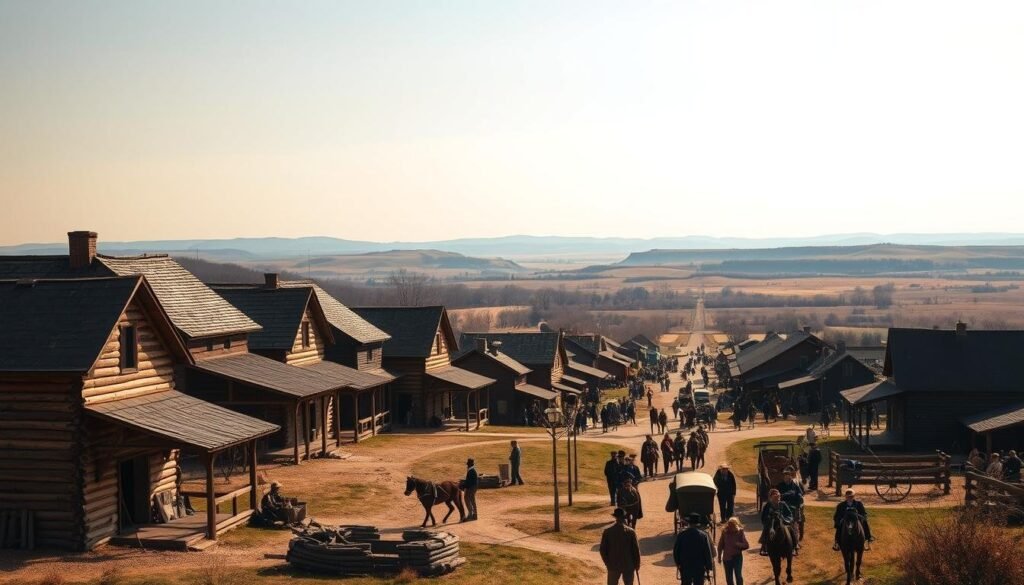Last updated on November 1st, 2025 at 06:35 am
Why Did the Mormons Leave Illinois? Ever wondered why a thriving Mormon community left Illinois? The reasons are tied to the state’s rich history.
Joseph Smith’s leadership was key in Illinois. As the Mormon community expanded, conflicts with non-Mormon neighbors grew. This led to their decision to leave.
Learning about this time offers a deep look into Mormon and Illinois history. [Why Did the Mormons Leave Illinois?]
Contents
- 1 The Mormon Settlement in Illinois
- 2 Joseph Smith’s Leadership and Influence
- 3 Growing Tensions with Non-Mormon Neighbors
- 4 Controversial Mormon Practices
- 5 The Murder of Joseph Smith
- 6 Why Did the Mormons Leave Illinois?
- 7 The Mormon Exodus to the West
- 8 Conclusion: Why Did the Mormons Leave Illinois?
- 9 FAQ
- 9.1 Why did the Mormons initially settle in Illinois?
- 9.2 What was the significance of Nauvoo in Mormon history?
- 9.3 What was the role of Joseph Smith in the Mormon community?
- 9.4 What were some of the controversies surrounding Mormon practices?
- 9.5 What led to the murder of Joseph Smith?
- 9.6 Why did the Mormons ultimately leave Illinois?
- 9.7 What were some of the challenges faced by the Mormons during their exodus to the West?
- 9.8 What is the significance of the Mormon exodus in American history?
The Mormon Settlement in Illinois
The Mormons moved to Illinois seeking a new beginning. They founded Nauvoo, a thriving community. Under Joseph Smith’s leadership, Nauvoo grew, attracting many new residents.
Building Nauvoo was a big challenge for the Mormons. They worked hard to build homes and infrastructure. Joseph Smith’s leadership was key in these early days.
Nauvoo’s growth was impressive. The community developed its own culture and practices. It was known for its strong sense of unity and cooperation.
Joseph Smith’s Leadership and Influence
Joseph Smith was more than a spiritual leader. He was also a skilled politician and entrepreneur. He guided the Mormon community, shaping its spiritual and temporal paths. [Why Did the Mormons Leave Illinois?]
Spiritual and Temporal Leadership
Joseph Smith’s leadership helped make Nauvoo a key Mormon center in Illinois. He drew new converts from all over the United States. His vision included spiritual growth and economic and social development.
In Nauvoo, the Mormon community thrived under Joseph Smith’s guidance. The city’s economy boomed, thanks to innovative farming and business ideas.
Joseph Smith balanced spiritual and practical needs well. He was a master diplomat and politician. He kept peace and stability in the community, even when tensions rose.
- Established Nauvoo as a major Mormon center
- Attracted new converts through his charismatic leadership
- Fostered economic and social development in the community
Joseph Smith’s leadership was vital to the Mormon community in Illinois. His impact continued to shape the community long after he left.
Growing Tensions with Non-Mormon Neighbors
As the Mormon community grew in Nauvoo, Illinois, things started to get tense. Conflicts over land and resources became more common. Cultural and religious differences made things even harder.
The Mormon practice of polygamy, or plural marriage, was a big issue. Many non-Mormons saw it as a threat to their values and norms. [Why Did the Mormons Leave Illinois?]
But it wasn’t just about religion. Economic and political factors also mattered. The Mormons’ success and growing influence made non-Mormons resentful.
- Economic competition for local resources
- Cultural differences that led to misunderstandings
- The practice of polygamy, which was controversial
These issues created a lot of distrust and hostility. Knowing about these tensions helps us understand the complex relationships between Mormons and their neighbors in Illinois back then.
Controversial Mormon Practices
Many people are surprised to learn about the Mormons’ practice of polygamy. This was just one issue that caused problems with their neighbors. The Mormons’ way of living, including their economic system and belief in divine revelations throughJoseph Smith, was often misunderstood.
Polygamy, or having multiple spouses, was a big issue. It caused moral and social problems with those around them. This practice was not just a problem within the community but also drew criticism from outside.
| Controversial Practice | Description | Impact on Relations |
|---|---|---|
| Polygamy | Practice of having multiple spouses | Increased moral and social tensions |
| Communal Economic System | Shared economic resources within the community | Led to suspicions of economic conspiracy |
| Claims of Divine Revelation | Belief in ongoing revelation through Joseph Smith | Caused concerns about loyalty and authority |

The Mormons’ economic system also added to the tensions. They shared resources and worked together, which made their neighbors wary. This was seen as a sign of exclusivity or even conspiracy.
Moreover, the Mormons’ belief in divine revelations through Joseph Smith was a point of contention. This belief was key to their faith but was often seen as a challenge to other religious leaders.
In conclusion, the Mormons faced a lot of controversy in Illinois. Polygamy, their economic system, and beliefs in divine revelations were misunderstood. These practices led to increased tensions and conflict.
See Also: Do Mormons Celebrate Easter? Faith Uncovered!
The Murder of Joseph Smith
Joseph Smith’s leadership was tragically cut short by his murder in Carthage, Illinois. This event, which happened in 1844, was a key moment in Mormon history. It marked a big change in how the community related to outsiders.
For months before the murder, tensions were high. There were many violent incidents. Joseph Smith, the Mormon leader, and his brother Hyrum were jailed in Carthage. But, a mob attacked the jail, leading to the deaths of both brothers.
After Joseph Smith’s murder, the Mormon community changed a lot. Without a leader, the community had to reorganize. This event influenced many of their future decisions. [Why Did the Mormons Leave Illinois?]
| Event | Date | Impact on Mormon Community |
|---|---|---|
| Joseph Smith’s Murder | June 27, 1844 | Leadership crisis and community reorganization |
| Mormon Exodus | 1846-1847 | Mass migration to the West, establishing new settlements |
| Brigham Young’s Leadership | 1844-1877 | Guided the community through a period of growth and challenges |
Learning about Joseph Smith’s murder helps us understand the Mormon community’s struggles. It shows how strong and flexible they were in hard times.
Why Did the Mormons Leave Illinois?
After Joseph Smith’s tragic death, the Mormon community in Nauvoo faced a tough future. The decision to leave Illinois was a big one. The Mormon exodus was a complex process driven by the need for a safe haven.
The hostility and persecution in Illinois made life hard for the Mormons in Nauvoo. The murder of Joseph Smith pushed them to find a new home. They wanted a place where they could practice their faith without fear.
Several factors led to the decision to leave Illinois. Growing tensions with non-Mormon neighbors and controversial practices were big concerns. The Mormon exodus was seen as the best option for the community’s survival.
Key Factors Leading to the Exodus
- Escalating violence and persecution
- Growing tensions with neighboring communities
- The need for a safe haven to practice their faith
To understand why the Mormons left Illinois, we must look at their experiences in Nauvoo. The Mormon exodus was more than just a physical move. It was a response to social and religious pressures they faced.
The Mormon Exodus to the West
What made the Mormons leave Illinois for the West? Their journey was a big move, with thousands crossing the Great Plains. They faced many challenges but kept going to find a new home.
The trip was tough, with bad weather, sickness, and fights with Native Americans. Yet, the Mormons stayed strong. Their courage shows how united they were in their faith.
On their way, they saw many different places, from the Midwest’s hills to the Rocky Mountains’ peaks. This long journey needed careful planning and teamwork.
The Mormon move to the West is a key part of Illinois history. It shows how the Mormon community interacted with the world around them. Learning about this helps us understand the area’s past and its people.
Conclusion: Why Did the Mormons Leave Illinois?
You now know why the Mormons left Illinois, a key moment in their history. This decision was made after facing many challenges. These included growing tensions with neighbors and the tragic murder of Joseph Smith.
Thinking about the Mormons’ move to the West shows their strength and willpower. Their journey highlights the ups and downs they faced as a community. [Why Did the Mormons Leave Illinois?]
Learning about the Mormons’ departure from Illinois helps us understand their past better. It shows how their history is deeply connected to American history. This knowledge helps us appreciate their journey more.
See Also: Are Mormon Tabernacle Choir Members Paid?
FAQ
Why did the Mormons initially settle in Illinois?
The Mormons moved to Illinois in the early 1840s. They were looking for a new start after leaving Missouri and Ohio. They founded Nauvoo and built a thriving community under Joseph Smith’s leadership.
What was the significance of Nauvoo in Mormon history?
Nauvoo became a key place for Mormon activities. It grew into a thriving city. Under Joseph Smith, it symbolized the Mormons’ dream of a new home. [Why Did the Mormons Leave Illinois?]
What was the role of Joseph Smith in the Mormon community?
Joseph Smith led the Mormon Church. His influence went beyond spiritual matters. He was also a politician and entrepreneur, shaping the Mormon community in Illinois.
What were some of the controversies surrounding Mormon practices?
Polygamy, or plural marriage, was a big issue. It was seen as a threat to traditional values. Their communal economy and claims of divine revelation were also seen as unusual and threatening.
What led to the murder of Joseph Smith?
Joseph Smith was killed by a mob in Carthage, Illinois, in 1844. This event was a huge blow to the Mormon community. It marked a turning point in their relations with outsiders.
Why did the Mormons ultimately leave Illinois?
After Joseph Smith’s death, the Mormons faced more hostility in Illinois. Leaving Nauvoo and migrating to the West was seen as the best option for their survival.
What were some of the challenges faced by the Mormons during their exodus to the West?
The journey to the West was a major challenge. Thousands of people had to cross the Great Plains. They faced harsh weather, disease, and conflicts with Native American tribes.
What is the significance of the Mormon exodus in American history?
The Mormon exodus shows the resilience and determination of the Mormon people. It’s a key part of American history, highlighting their challenges and triumphs.

Ramona Pearson is a U.S.-based religious researcher and writer with over 10 years of experience studying Mormon history and beliefs. She is also a practicing Mormon and writes to inform readers with accuracy and balance.

